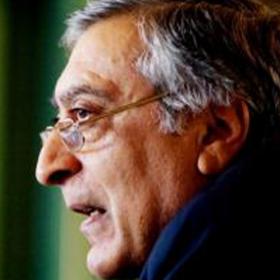
U.S.-India Ties: Slow but Steady
Writing in the Daily Mail, EWI Board Member Kanwal Sibal, former foreign secretary of India, discusses the upcoming meeting between President Obama and Prime Minister Singh, emphasizing the importance of the bilateral relationship.
All eyes will be on the meeting between our Prime Minister and President Obama this week and what it produces. This is natural as our relationship with the U.S. is, in many ways, the most important external relationship we have.
The U.S. is our largest trade and investment partner as well as the biggest source of advanced technology, management practices and technical and financial consultancies for our economic sector. The people to people contact with the U.S. is profound, not only because of the large population of Indian origin and the almost 100,000 students we have there, but also because of the influences imbibed by our younger generation.
The range of our engagement with the U.S. is larger than with any other country, with over thirty on-going dialogues on various subjects, which implies a regularity of official exchanges on economic, political and security issues.
Expectations
Our armed forces have the largest number of military exercises with the U.S., even though it is not our largest supplier of defence equipment. However, here too the U.S. is making headway, with substantial orders already obtained, even as promises are being made of joint production of advanced weaponry and transfers of technology to rival Russia as our leading defence partner. The political commitment shown by the U.S. leadership to remove the most contentious nuclear issue in our relations has raised expectations on our side that dramatic breakthroughs in relations will continue, even though we cannot define what they could be precisely. At the very least, we expect a trouble free relationship with the U.S.
On the U.S. side, the expectations are more concrete and precise. They would want orders for the U.S. nuclear and defence industries to materialize quickly enough as a quid pro quo for the nuclear deal. They want more access to the Indian market, for which financial and education sector reforms are considered necessary, not to mention improved regulatory frameworks.
To the old grievances have been added new ones relating to Indian protectionism as indicated by the decision to give preferential market access to locally established companies in the telecom sector, the retrospective application of our tax laws as in the Vodafone case and inadequate protection to IPRs as decreed by the Supreme Court in the Novartis case.
None of these decisions involve U.S. companies, but the U.S. has concerns that India’s example might be followed by other countries affecting ultimately either the global business models of its companies or negatively impacting their future operations in India.
The U.S. corporate sector, earlier in the forefront of lobbying for India in the U.S. ongress, is now taking the lead to have Indian trade practices investigated by the Congress. All the indications are that the mood in the U.S. towards India has soured at the political and commercial levels.
This is unfortunate because short term considerations of immediate gain are gaining ground over longer term U.S. strategic investment in the India relationship. India’s views about the U.S. have changed fundamentally and the relationship will become more dense with time. U.S. impatience will not necessarily accelerate the process.
India and the U.S. have differences on WTO and Climate Change related issues. These differences are in a multilateral context, not a bilateral one, but the U.S. is trying to push for bilateral convergences on these issues. Such pressure should not become counterproductive. India’s nuclear liability law has become a major obstacle in implementing India’s commitment to place orders on Westinghouse and GE for supply of nuclear reactors generating 10,000 MWs of power at two separate sites in india. Secretary Kerry had voiced his expectation that by September India would have found a way to resolve the issue to the satisfaction of U.S. companies, having no doubt Prime Minister’s visit to Washington in view.
Results
Reports suggest that India may find a solution by interpreting the rules framed under the Liability Act flexibly enough to meet the demands of not only the U.S. companies but the Russians as well for Kudankulam 3 and 4. This may not be easy in view of Article 17 of the legislation that obliges the operator to take recourse against the supplier for supply of defective equipment, even if the right to recourse is not expressly included in the contract. The challenge is to devise a way to provide insurance cover for such liability through some kind of a pooling arrangement, the cost of which can be adjusted in that of the project. Meanwhile, the decision to sign a “small works agreement” between Westinghouse and NPCIL during Prime Minister’s visit as a token of our intent to implement our commitment might be a diplomatic way out of the current impasse for now, but the larger questions of project cost and tariff competitiveness will remain unaddressed and could block negotiations in the future and cause disappointment.
On the Afghanistan question president Obama will not give us satisfaction as he is seeking a dialogue with the Taliban brokered by the Pakistani military. India’s political and security interests in Afghanistan are becoming peripheral to U.S. interest in an orderly withdrawal from there through a pact with the very extremist forces that they had initially dislodged and an understanding with the Pakistani military whose double-dealing they have directly experienced. With the continuing terrorist mayhem in Pakistan and extremist religious forces on the rampage in West Asia and Africa, accommodating the Taliban could prove a folly.
The PM’s Washington visit is unlikely to produce any dramatic result, but it will serve its purpose by reminding both sides of the high stakes they have in a progressively improving relationship that is undistorted by impatience or undue expectations on either side.

